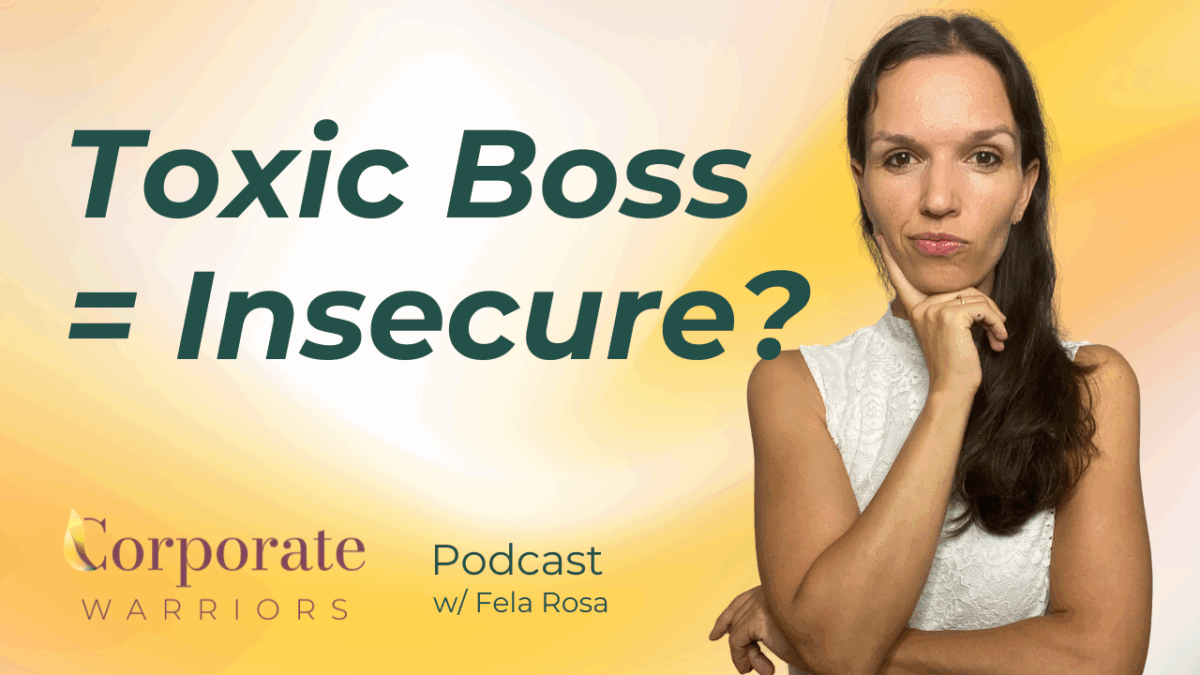Podcast #57

The Insecurity Behind Toxic Leaders
At the core of every toxic leader isn’t strength (even if they really want you to believe so….) – it’s insecurity. While they may project confidence, their actions are often driven by fear: fear of being exposed, fear of losing control, or fear of being outshined by someone.
In this episode of the Corporate Warriors Podcast with Fela Rosa, I break down how insecurity drives toxic leadership, how you can recognize it in your own workplace, and – most importantly – what you can do to protect yourself as a high performer.
Why insecurity is the hidden driver of toxic leadership
Toxic leaders rarely act from a place of genuine authority. Instead, they are often protecting their self-esteem and confidence through stressing their ‘superiority’ in the company hierarchy.
Some of the most common behaviors include:
- Micromanaging instead of trusting their team
- Taking credit for others’ success while shifting blame for failures
- Reacting defensively to feedback or new ideas
- Belittling or undermining people to maintain control
- Comparing employees constantly to keep them on edge
When you start to see these patterns through the lens of insecurity, you hopefully realize that it’s not about you. It’s not personal at all.
What this means for high performers
If you’re a high performer, your very strengths can become a trigger for an insecure boss. The better you are at your job and the more established your network and reputation is, the more threatened they may feel.
This can lead to:
- Blocked growth: insecure leaders may limit opportunities out of fear you’ll outshine them
- Burnout: pushing yourself harder and harder to win approval that will never come
- Self-doubt: questioning your abilities because of constant criticism or shifting expectations
- Emotional exhaustion: walking on eggshells and never feeling safe to just do your work
Understanding this dynamic helps you protect yourself from internalizing their toxic management styles as your weakness.
Reflection prompts to check if your boss is insecure
Spotting insecurity in leaders isn’t always easy because it often hides behind a polished façade of authority. Still, certain patterns reveal the truth. Use these prompts to reflect on your own workplace experience:
- Do they get defensive when offered feedback or new ideas?
- Do they micromanage every detail, even when unnecessary?
- Do they hoard credit for wins but shift blame when things go wrong?
- Do they put others down to appear stronger?
- Do they surround themselves with “yes-people” instead of encouraging diverse opinions?
If several of these resonate, it’s an indication you’re dealing with an insecure leader. And that matters because insecure leadership isn’t just really frustrating and resource-consuming, it can have real consequences for your career growth and mental health.
Why insecure leaders are harmful in the long run
Insecure leaders often operate from a place of scarcity. They believe recognition is limited and know that only ‘so many’ can get promoted to the next level, so they compete with their own team instead of empowering them. Over time, this creates a toxic culture where innovation dies, trust is broken, and high performers either burn out or leave.
For example:
- An insecure boss may withhold important information so they remain important and in full control as they are the “gatekeeper.”
- They might sabotage your visibility in front of senior executives out of fear you’ll be seen as more competent or a potential talent that might be able to fill their own role one day.
- Or they may constantly shift expectations so you never feel like you’ve done enough and so that your confidence declines over time.
Understanding these dynamics helps you step back and realize: This isn’t about your lack of skill. It’s about their lack of security.
What you can do about insecure leadership
Recognizing that your leader’s toxic behavior comes from insecurity is only the first step. The real shift happens when you take action to protect your energy and career.
Start by detaching your self-worth. When your boss lashes out or criticizes unfairly, remind yourself: This is about their fear, not my value. That mental reframe alone can stop you from spiraling into self-doubt.
Setting boundaries is just as crucial. For example, if your boss emails you late at night demanding immediate answers, you can begin training them to respect your limits by not always responding right away. Over time, boundaries remind you – and them – that your life and worth are bigger than corporate games.
Finally, don’t underestimate the power of external validation. Mentors, peers, or coaches can provide perspective your boss never will. They can help you see your strengths clearly, keep your confidence intact, heal the scars that toxic management has on you, and map out your next steps strategically.
And yes – sometimes the healthiest option is planning your exit. If that’s the only option, the most important thing is that your toxic leader will no longer have power over your professional development. If the environment doesn’t improve, start preparing your career move so you can thrive under leadership that lifts you up rather than holds you back.
Accelerate Your Career Today

Daily Workbook
Establish the routine of working on your career daily. With our new workbook, you will start to see and keep track of your own advancements.

Career Coaching
For professionals that want to get ahead in the fastest way, book a package of 1-on-1 coaching sessions for individual guidance and support.

Newsletter
Your career is a long-term process. That makes it incremental to stay on track effortlessly. Subscribe to our newsletter and stay focused on your dream career.
